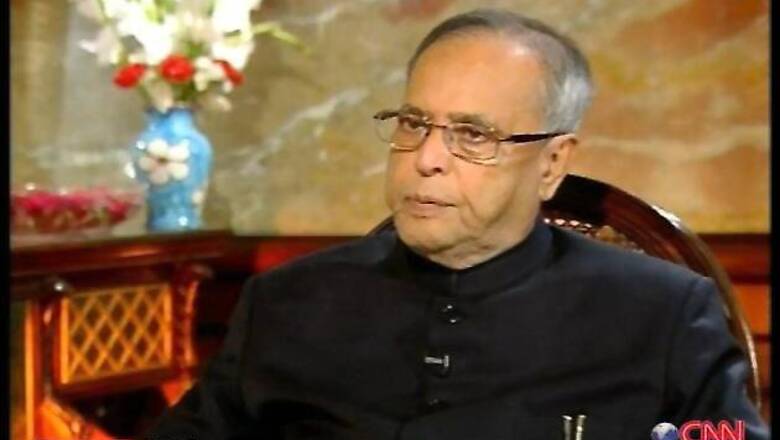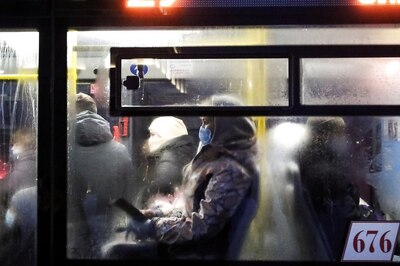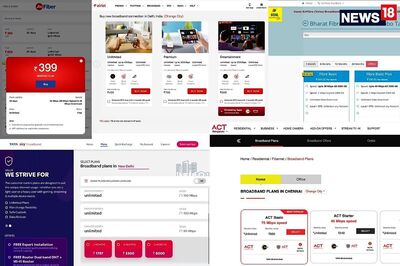
views
A date is finally set. The Union Budget will be presented on March 16 post the State elections. This could be the UPA government's make-or-break Budget. The economy is going through a slowdown. The bureaucracy is in a state of paralysis and corporate India is suffering from a bout of depression.
Given these fiscal and political constraints can Pranab Mukherjee change the mood of the nation? Will he present an agenda for growth or a statement of accounts?
Adi Godrej, president designated of the Confederation of Indian Industry; Sunil Munjal, chairman of CIIs Economic Policy Council; Rajiv Memani, chairman of CIIs Task Force on GST implementation and Naresh Trehan Chairman of CIIs National Committee on Healthcare discuss India Inc's expectations from Budget 2012.
Below is an edited transcript of his interview.
Q: Is this clearly going to be a make-or-break Budget? What do you think is going to be the one big idea as far as Budget 2012 is concerned?
Godrej: This is going to be an extremely important budget because two things need to be done very strongly - one is to provide some incentives for the economy to grow and secondly, fiscal balance must be maintained. It will need more than just the Budget, to my mind the Finance Minister should work extremely hard to see that the Goods and the Services Tax (GST) is passed during the next financial year, the earlier the better. The earlier it is passed his fiscal position will be better.
The other major thing he needs to do is to ensure disinvestment. Fortunately, the stock markets have recovered, disinvestment could be a very good thing to look at in this Budget, he needs to look at areas where reduction in tax rates could lead to in fact increased collection, there are many such areas, surcharges should be gotten rid of, in certain cases some rates can be reduced and collections could actually increase because it would spur economic growth.
Q: Do you believe that given the fiscal room that he has there is going to be any sort of a reduction in taxes or do you actually believe that we are going to see a hike in taxes especially on items like diesel vehicles, as well as in goods like cigarettes?
Memani: Yes, on diesel vehicles at least by what one reads and what's happening, that it's likely that it may come. Cigarettes are the favourite and come up every year. So I am sure they will not miss n it this year. I am not sure whether they will have room as much to reduce tax rates, but my sense is they would be well advised to preserve and not increase tax rates whether an indirect tax or on the direct tax side.
If they can provide for some incentives especially around investment allowance or something, which may not have an immediate impact, but it will encourage manufacturing, that will be great. I think it's important that they will also need to augment tax revenues. They have to try and see there is a lot of money that's locked in disputes and one of the thrusts could be to see how they can unlock the money that's stuck up in disputes.
Q: Do you anticipate a hike as far as service tax is concerned because that's the big buzz and speculation at this point? Do you expect a hike in service tax?
Memani: No, I don't expect so. If they try and bring in the negative list then I hope there is no hike. If they bring in the negative list which looks quite likely, they will stay away from those areas that are there in the state ambit. Even if you look at the GST, the central rate is around 10%. So, I don't think they will hike it.
Q: The big idea this time around could perhaps be the Food Security Bill. There are question marks and apprehensions on how he is actually going to finance it. He hasn't been able to come up with recedes on the disinvestment front. It is the first planned year of the 12th plan and automatically we will see expenditure going up. Is the food security idea going to be the big ticket scheme this time around you think?
Munjal: I am hoping he will surprise us and do more than just food security. As you are aware the CSO advance estimates came out today and the number they have given for GDP is 6.9%, which by itself is along expected lines. But the worry is agriculture which they have said is likely to be 2.5%. Food security also means additional collection and distribution of food; it's not just a number. So on one hand is the fiscal requirement to be able to fund it, second is the practical requirement of being able to grow and distribute this.
There is a serious amount of work which needs to be done on the agriculture policy both in the states and at the center, whether its getting them to agree to a model APMC Act and there are whole host of issues, land ownership, land transfers around agriculture. There is serious work which has to be done and if we are going to have a bill of this nature, we are going to have to find the resources to fund this as well.
We have no fiscal headroom at present. So, we need to create that fiscal headroom. We will also need to widen the tax base, not just keep the rates where they are or lower them for better compliance. We have no choice but to widen the tax base as well. So, we will have to work on both.
Q: In terms of the reform agenda and from an intent point of view, what do you think the government is going to prioritize and focus on?
Munjal: One of the things which has happened this year is that they have moved the date of the Budget to be post the state elections. Since state elections will be over, he may not make any single big bang announcement, but I think of the number of issues which are pending, he is going to pick up chunks of those and make those as announcements in the Budget. This is why I am hoping for a positive surprise; not just one, but I think we will see more than one announcement come in this Budget.
Q: The healthcare sector had a little bit of a disappointment last year. This time around, what are you anticipating in terms of the social sector focus as far as the government is concerned because clearly it's going to be big on the agenda?
Trehan: It's very clear to everybody that we have huge ground to cover as far as providing healthcare to our citizens is concerned; it's actually dismal right now. So we know that we need to double the healthcare delivery system and make it more affordable at all levels.
So with that in mind, there are three things that we have asked for. One is to be able to stimulate the creation of capacity and that the government provide us infrastructure status. The finance minister had already alluded to this in his speech in Parliament and then said that the finer points or the details will be announced later, but it hasn't happened so far. So we are requesting the finance minister this year again to spell it out clearly so that we know that people will get encouraged to create more capacity which is very surely needed.
Second thing we have asked for is that we should have more doctors and paramedical personnel. Today we are producing anywhere around 25,000 doctors and we need to double it to 50,000. So we actually need to modify the rules of creation for medical schools, other paramedical facilities and funding provided so that in the coming years we can accomplish that which is necessary for us to be able to deliver the healthcare that the nation needs.
Third point is that we want the insurance sector to be pushed forward so that it come up with programs or products which will enhance the Rashtriya Swasthya Bima Yojna (RSBY) Scheme which is already there on the ground for below poverty line people.
We need to enhance that scheme and we need to come up with PPP models which will make it possible to deliver care at that level in rural areas and semi-rural areas. So these are things that are actually pending for a long period. Overall, the budget for healthcare allocation this year, which was Rs 26,000 crore last year, needs to be at least doubled so that we can in coming years make up for all the years that we ignored healthcare to the people.
Q: Since the Budget is after the election, do you believe he is going to have a little more room to perhaps move on things like subsides? Do you believe that we are going to see a decisive move towards cutting down subsides this time around?
Godrej: There won't be a better time for him to do that except for immediately after a major election is over, so I expect a lot of subsidies will be rationalized this budget. As you rightly put, there are certain items on which excise increases like diesel cars or cigarettes is very likely to my mind. Also there are some opportunities to increase import duties in some cases. For example, I know a case in the vegetable oil business where both Indonesia and Malaysia are subsidizing their value added manufacturers. Clearly we need to react to that and that can create for considerable additional revenue.
Another suggestion I have for the Finance Minister is a little out of the ordinary. The budget is generally a like a profit and loss statement, but he needs to publish a balance sheet of the government and mark it to market. He may not be able to do it right in this budget, but he should make an attempt to do it so that the government and we know exactly what the valuation of all the government's assets is so that the liquidation programme can be worked out over a five year period.
They are tremendous, whether it's government owned land, government owned public sector projects etc. I think disinvestment can be a major source of revenue over the next two-three years to balance the budget and improve the fiscal balance.
Q: I just want to pick on the point of disinvestment. Public sector companies are opposed to any form of disinvestment at this point in time, but we have seen how the government has arm-twisted them into hiking disinvestments to bridge the fiscal deficit. We now have the possibility of an auction route to bridge the fiscal deficit and to get more money by way of disinvestment receipts, but there is opposition from public sector companies to go down the disinvestment path?
Godrej: No I don't think there was an opposition to disinvestment. It was an opposition to buyback of shares, which means you affect the cash of the public sector companies, which is required for growth.
Q: There was an opposition to buyback, but there was also an opposition to a follow-on public offer. For instance, SAIL very publicly stated it wasn't interested in doing an FPO at this point in time.
Godrej: Yes, but that was a time when the stock market condition was such that an FPO would be difficult. In today's stock market, which has improved considerably since the 1st January, it can be considered and in the next financial year perhaps they will get times where that could be done.
In fact, they are way too late for the disinvestment. It should have been done early in the fiscal year when the stock market conditions are good. For example, in April-July period, there could have been a lot of disinvestment successfully.
Memani: I think what the government can also do is, in the earlier round of disinvestment that happened they were still holding minority stakes in some of those companies and they are now quite valuable. So, that is not linked to the market, I am surprised that the government is not pushing the pedal on that because that can release a significant amount and help them come very close to their disinvestment target.
Q: You are talking specifically about BALCO and Hindustan Zinc aren't you?
Memani: Those two and there are two-three other companies as well. So, I am surprised that they are not pushing the pedal on that. There is a question mark at least in my mind as to why they are not pushing.
Q: Post the Vodafone ruling, we are actually going to see the government move towards GAAR like provisions perhaps in this Budget itself. What are you picking up? Do you anticipate that happening?
Memani: You are right; the government has taken this as a setback. They are viewing this as a setback. There was first some apprehension that they may want to bring in something that is retrospective but that's very unlikely given the fact that the Supreme Court has delivered a very clear verdict and I don't think they would want to take on the verdict of the Supreme Court. They understood the intent.
What I have always said is if the statute doesn't support what the government is intending to do, they may bring in some GAAR like provision. They may not bring in some more stringent anti-avoidance rules, they may bring in limitation of benefit clauses around the Mauritius treaty, but there is a downside to it which is why the government has always been hesitant in doing that. There are a string of other cases that are likely to come up which pretty much establishes that the earlier provisions did not support what the government is intending.
Q: Infrastructure is likely to be another area of focus as far as Budget 2012 is concerned. Tax concessions as far as infra bonds are concerned, the infra debt fund, clarifying certain issues with regards to the infra debt fund, perhaps those will be areas that he would like to clarify. But things like the power sector, at this point in time looks absolutely abysmal. Now the PMO's office is trying to take charge of that situation. On infrastructure specifically what do you see the finance minster saying this time around?
Munjal: We have seen two or three successful bond issues in recent times. They will certainly take advantage of that and push more and more of the infrastructure companies and public sector companies to move in that direction. We have three different options right now. One is the minority stake entities and there are other non-strategic businesses that the government is still invested in, in which it could easily cash out. Even if they don't cash out completely from equity, they have huge assets like land banks sitting in many of these companies and those can certainly be en-cashed. I am not sure why we have not even thought about it.
Q: Corporate India seems to have adopted this mindset where the fiscal deficit should be bridged by way of divestment. But fundamentally, that can only take us so far. He has to look at streams that generate revenue because disinvestment can only take us so far.
Munjal: I don't think there is an argument. To my view, has to find a way to push for growth, he has to find a way to prune expenditure and he has to increase revenues by widening tax base. And it's not that if he can do one at the cost of the other, there is no option, you have to do all three of them.
This willy-nilly means looking at subsidies once more sharply. You cannot eliminate subsidies, that's accepted now, but you can target them better with Aadhar getting rolled out. I think certainly you have the tool available and if the intent is there I think it's certainly possibly now to have a much sharper focus. Even doing dual pricing of products, which we have always discouraged because it leads to mischief with specific identity of each individual, is available.
Q: CII is actually recommending dual pricing of diesel; is that really practical?
Munjal: This is exactly the point I am making, now it is possible. When you have individual identity which you cannot change, especially if it's locked in with biometrics, then you can do these things and use these tools that's what these are for.
The earlier problem was the extreme leakage and almost mismanagement of some of these systems and the amount of money which was going in was actually certainly not reaching the target audience.
Q: Stick your neck out and tell me what you really think he is going to be able to deliver?
Munjal: I think he is going to focus on growth because the reality today is unless you get growth you are not going to generate revenue. As you said, unless you have additional revenue none of the schemes that we are talking about is going to be possible to implement. So he has to find a way to focus on growth, whether it's through additional investment allowance kind of schemes, whether it's extended depreciation, R&D being extended to all activities or a whole host of other activities which are possible to do which will create growth.
So we have to be able to give out funds to allow growth and the government is not giving this up, it's coming from the additional revenue which will get created and that then will allow us to run some of the social schemes in the manner that we would like them to see. At the same time, we are a bit wary because we don't want bits and pieces of things like DTC coming into this budget without all things comprehensively looked at. This is why we said DTC must come only if and when GST comes. We hope GST comes this year, if not with the budget, which seems unlikely, certainly by October of this year.
Q: The hope is that DTC and GST should come in together, but what we are picking up is that some aspects of the DTC and some aspects of the GST may come through this time around. He may make the transition towards both is that your sense?
Memani: I think the empowered committee will be about to give their report, so I have a feeling that they will respect the role that the empowered committee is going to play. I am hopeful that unless it's something it is very critical, provisions within the DTC will not come.
Q: Are you going into this Budget with tempered expectations or do you have high hopes?
Godrej: I have good hopes from the Budget. I think it must be growth-oriented, and I think there is a very strong probability of him trying to bring the balance. The fiscal balance that is required through a combination of disinvestment. Service tax will be expanded to make it into a negative list, so that there will be much greater collection of service tax in the next fiscal. I think he will have to reduce some subsidies, as has been planned, but not implemented in this fiscal.



















Comments
0 comment